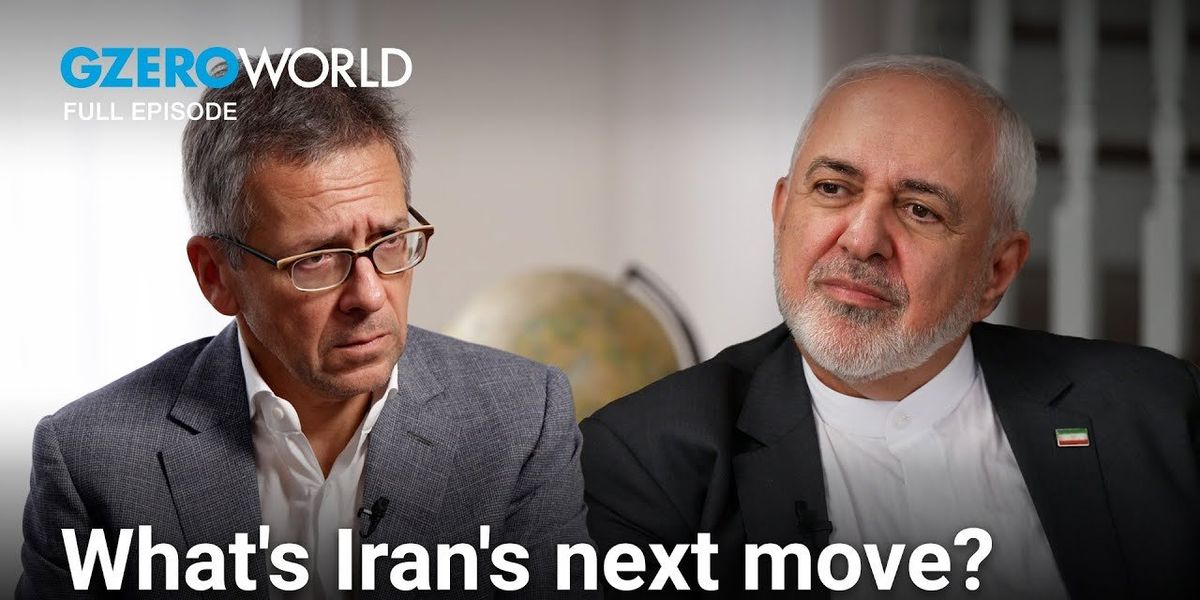Trending Now
We have updated our Privacy Policy and Terms of Use for Eurasia Group and its affiliates, including GZERO Media, to clarify the types of data we collect, how we collect it, how we use data and with whom we share data. By using our website you consent to our Terms and Conditions and Privacy Policy, including the transfer of your personal data to the United States from your country of residence, and our use of cookies described in our Cookie Policy.
{{ subpage.title }}
Iran's next move: Interview with VP Javad Zarif
As the anniversary of the Oct 7th Hamas attacks approaches, tensions in the Middle East are reaching a boiling point. Israel has ramped up its military operations against Iran-backed forces, launching devastating airstrikes across Gaza, Lebanon, and Yemen. The assassination of Hezbollah leader Hassan Nasrallah and Israel’s ground offensive into Lebanon has further escalated the conflict, as has Iran sending a wave of missiles towards Israel.
On GZERO World, Ian Bremmer sits down with Iran's new Vice President for Strategic Affairs Mohammad Javad Zarif just days before the Nasrallah assassination and Iran’s response. In their conversation, Zarif delves into the far-reaching ramifications of the ongoing conflict. He says, “So the myth of Israeli invincibility is gone. And I think that's a major loss for Israel.” Zarif also speaks about what he calls Iran’s unwavering stance on its right to self-defense and its determination to not fall into Israel’s “trap.”
And with an upcoming election, Zarif weighs in on the prospects of a Harris or Trump administration and addresses accusations of Iranian meddling. Zarif notes, “I don't have any preference. But some may prefer him in Iran. Some may believe that he is more in the national interest of Iran.”
Although Iran’s new president has promised to find common ground with the West, recent events have made it clear that the geopolitical tightrope remains perilously thin. As tensions continue to flare, the world waits and asks: What is Iran's next move?
GZERO World with Ian Bremmer, the award-winning weekly global affairs series, airs nationwide on US public television stations (check local listings).
New digital episodes of GZERO World are released every Monday on YouTube. Don't miss an episode: subscribe to GZERO's YouTube channel and turn on notifications (🔔).
- Are US threats making Iran rethink retaliation against Israel? ›
- Will Israel strike Iran – and if so, how hard? ›
- Israel invades southern Lebanon, threatens Iran ›
- Iran launches ballistic missiles at Israel in revenge attack ›
- Israel hits Iran directly – what next? ›
- How October 7th changed Israel and the Middle East - GZERO Media ›
- Israel's next move - GZERO Media ›
U.S. President Joe Biden raises a toast during the White House Correspondents' Association Dinner in Washington, U.S., April 27, 2024.
Pro-Palestine activists protest Biden, promote boycotts
President Joe Bidentook shots at rival Donald Trump at the annual White House Correspondents Dinner in Washington, DC, Saturday night, while pro-Palestinian protesters voiced their anger outside.
Demonstrators accused attendees of supporting Biden’s handling of the Israel-Hamas war and decried the killing of 97 journalists in Gaza, including 92 Palestinians. “Every single person in there is choosing to stay on the side of history that sides with profit over freedom,”said Mimi Ziad, a protest organizer from the Palestinian Youth Movement.
Those views have been gaining traction on campuses across the US, and now, Canada.Protesters at McGill University in Montreal set up an encampment and are demanding that the school divest from funds and companies associated with Israel. The move represents an escalation of the Boycott, Divestment, Sanctions movement inspired by student 1980s protests targeting apartheid that saw 150 schools divest from South Africa.
Will that happen with Israel? On Friday, Portland State University* President Ann Cudd said her school would pause receiving philanthropic gifts from Boeing, which provides equipment to the Israel Defense Forces, until students and faculty hold a debate in May.Other schools, including Harvard, Columbia, and the University of California, have thus far rejected calls for divestment.
* Correction: This article originally listed the University of Portland, rather than Portland State University.
